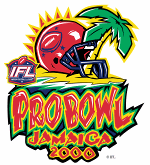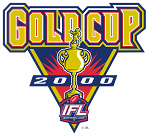Indoor and Arena Football History
 | Indoor Football League 1 (IFL 1) Active: 1999-2000
|
Trucking business owner Keary Ecklund had originally been interested in bringing an Arena Football League franchise to Green Bay in the 1980s, but the AFL told him Green Bay was too small for one of its teams. Instead, he became a founding member of the PIFL. As co-owner of the Green Bay Bombers and Madison Mad Dogs, Ecklund had an opportunity to see how running an indoor football league could work, and how it didn't. He quickly tired of having to pay the expenses of underfinanced PIFL teams so they could make the trip to Wisconsin. Once the Arena Football League settled its lawsuit with the PIFL, clearing the last legal question facing indoor football, Ecklund was ready to make his move
On July 23, 1998, he announced the formation of the Indoor Football League. Instead of having teams spread out across the country, Ecklund would instead concentrate on midsize markets in the Midwest to cut down on travel costs. To avoid any underfinanced owners, Ecklund would initially own nearly every team himself, relying on local management groups to conduct day-to-day business. He also brought NFL Hall-of-Famer Kellen Winslow on board as commissioner, though Ecklund made all league decisions.
The Wisconsinite envisioned a 20-team league and convinced Colorado Wildcats owner Tom Schaefer to join him, but Schaefer walked away from the team after the PIFL finished its season. Instead, Ecklund built the league around his Wisconsin franchises, scaling back to an eight-team circuit that also included the Peoria Pirates, Dayton Skyhawks, Duluth-Superior Lumberjacks, Lincoln Lightning, Steel Valley Smash (Wheeling, WV) and Topeka Knights. Only Lincoln and half the Topeka franchise had outside ownership. Attendance was generally solid the first season, with Peoria and Lincoln runaway success stories. Green Bay edged Peoria to capture the first IFL title.
“Within two years, we could be the largest football league in the world, but the key is the midsized market,,” Ecklund told the Duluth News Tribune. “Nobody’s ever done that with this sport. They’ve always held it in the large markets. Arena football has been in New York City twice. Arena Football has had 33 teams go out of business in 12 years, and they keep plugging the big markets.”
 The following season the IFL ballooned to 21 teams with the addition of the Bismark Blaze, Black Hills Machine, Billings Thunderbolts, Casper Cavalry, Erie Invaders, Fargo Freeze, Flint Flames, Johnstown Jackals, La Crosse River Rats, Minnesota Purple Rage, Sioux City Attack, Sioux Falls Cobras and Witchita Warlords.
The following season the IFL ballooned to 21 teams with the addition of the Bismark Blaze, Black Hills Machine, Billings Thunderbolts, Casper Cavalry, Erie Invaders, Fargo Freeze, Flint Flames, Johnstown Jackals, La Crosse River Rats, Minnesota Purple Rage, Sioux City Attack, Sioux Falls Cobras and Witchita Warlords.
"I know it sounds like it's a pretty large expansion," Ecklund told the Wichita Business Journal. "We will build our divisions around the teams we will have the first years. The rivalries, those are the best games. That is what you build this game on."
 A management disagreement in Topeka led Ecklund to take full control of the Knights in midseason, resulting in them being renamed the Kings. Not even the added competition could keep Peoria from the title as they topped Bismarck in the 2000 IFL championship game.
A management disagreement in Topeka led Ecklund to take full control of the Knights in midseason, resulting in them being renamed the Kings. Not even the added competition could keep Peoria from the title as they topped Bismarck in the 2000 IFL championship game.
Unfortunately for many indoor football fans, the Pirates would not get a chance to defend their IFL title. On October 20, 2000, arenafootball2 executive director Mary Ellen Garling announced that af2 had acquired the Indoor Football League and all franchises but Topeka. While the league declared its intentions to field teams in all former IFL markets, only Peoria, Lincoln and Wichita (as the Stealth) would end up in af2. Several of the remaining IFL markets scrambled to field NIFL teams.
"This is a momentous day for arenafootball2," Garling said. "The acquisition of the IFL gives arenafootball2 the ability to grow and generate a new fan base that has never been exposed to the game of Arena Football, while continuing our expansion goal of reducing travel expenses and creating natural geographical rivalries."
"We're proud that the Indoor Football League can add an important building block to arenafootball2," said Ecklund. "By combining these leagues we can offer the greatest number of fans the best opportunity for their long term enjoyment of Arena Football. We think the excitement and support we've generated in IFL markets will blend well with the existing teams in af2."
The IFL featured a couple of rules innovations. Chief among them was the rouge, a single point awarded to the defense when a kickoff returner was tackled in his own end zone. A "live punt" rule also kept receiving teams on their toes.
1999-2000 IFL Standings and Game Scores
1999-2000 IFL Franchise Histories
Bismarck Blaze
Black Hills Machine
Casper Cavalry
Dayton Skyhawks
Duluth-Superior Lumberjacks
Erie Invaders
Fargo Freeze
Flint Flames
Green Bay Bombers
Huntington/West Virginia Attack
Iowa Voltage
Johnstown Jackals
La Crosse River Rats
Madison Mad Dogs
Minnesota Purple Rage
Nebraska Knockout
Omaha Blitz
Quad Cities Quake
Rochester River Raiders
Rockford Rockers
Sioux City Attack
Sioux Falls Cobras
Springfield Slayers
Steel Valley Smash
Topeka Kings
Topeka Knights
Wheeling Ironmen
Wichita Warlords